- Home
- Robin Hobb
Fool’s Assassin: Book One of the Fitz and the Fool Trilogy Page 4
Fool’s Assassin: Book One of the Fitz and the Fool Trilogy Read online
Page 4
“I’ll think well on what you have said to me,” I promised. Web deserved that courtesy from me. Time to leave this topic. “Did you ever manage to have words with our odd guests?”
He nodded slowly. “I did. But not many, and with the woman only. Tom, she made me uneasy. She rang oddly against my senses, as muted as muffled bells. She claimed that they were traveling jugglers and hoped to entertain us later. She was stingy in speaking of herself, but full of questions for me. She was looking for a friend of hers, who might also have come this way recently. Had I heard of any other travelers or visitors to the area? And when I told them that while I was a friend of the household, I had but arrived this night as well, then she asked me if I had met any other strangers on the road.”
“I wonder if a member of their party became separated from them.”
Web shook his head. “I think not.” He frowned slightly. “It was passing strange, Tom. When I asked who …”
And then Just touched my elbow. “Mother would like your help,” he said quietly. A simple request, yet something in the way he said it alarmed me.
“Where is she?”
“She and Nettle are in Lady Patience’s chambers.”
“At once,” I said, and Web nodded as I set off.
Chapter 2
SPILLED BLOOD
Of all the magics known to be possessed by men, the highest and noblest is that collection of talents known as the Skill. Surely it is no coincidence that through generations of Farseer rule, it often manifests in those destined to become our kings and queens. Strength of character and generosity of spirit, the blessings of both El and Eda, often accompany this hereditary magic of the Farseer line. It conveys to the user the ability to send his thoughts afar, to influence gently the thinking of his dukes and duchesses, or to strike fear in the heart of his enemies. Tradition tells us that many a Farseer ruler, his strength supplemented by the courage and talent of his Skill-coterie, could work wondrous cures on both body and mind as well as commanding both his ships at sea and our defenders upon the land. Queen Efficacious established six coteries for herself, placing one Skill-talented group in each duchy, and thus making the magic of the Skill available to each of her trusted dukes and duchesses during her enlightened reign, to the great benefit of all her people.
At the other end of the magical spectrum is the Wit, a base and corrupting magic that most often afflicts the lowborn who live and breed alongside the animals they cherish. This magic, once thought to be useful to goose girls and shepherds and stable boys, is now known to be dangerous not only to those who succumb to its influence but to all those around them as well. The mind-to-mind contamination of communicating with beasts leads to animalistic behaviors and appetites. While this writer laments that even nobly born youth have been known to fall prey to the attractions of beast-magic, I cannot sympathize beyond wishing that they be quickly discovered and eliminated before they can infect the innocent with their loathsome appetites.
ON THE NATURAL MAGICS OF THE SIX DUCHIES,
SCRIBE SWEET-TONGUE
I all but forgot our strange visitors as I hurried through the halls of Withywoods. My immediate fear was for Patience. She had fallen twice in the last month, but blamed it on the room “suddenly whirling all about me.” I did not run but my stride was as long as I could make it, and I did not knock when I reached her chambers but darted straight in.
Molly was sitting on the floor. Nettle knelt beside her and Patience stood, flapping a cloth at her. There was a pungent smell of sharp herbs in the room, and a little glass vial rolled on its side on the floor. Two serving women stood in a corner, obviously bullied away from her by Patience’s sharp tongue. “What happened?” I demanded.
“I fainted.” Molly sounded both annoyed and ashamed. “So silly of me. Help me up, Tom.”
“Of course,” I said, trying to hide my dismay. I reached down for her, and she leaned on me heavily as I drew her to her feet. She swayed slightly, but hid it by clutching my arm.
“I’m fine now. A bit too much whirling about on the dance floor, and perhaps too many glasses.”
Patience and Nettle exchanged glances, undeceived.
“Perhaps you and I should let our evening end. Nettle and the lads can perform the duties of the house.”
“Nonsense!” Molly exclaimed. Then she looked up at me, her eyes still a bit unfocused, and added, “Unless you are weary?”
“I am,” I lied expertly, concealing my rising alarm. “So many folk all in one place! And we have three more days of this, at least. There will be plenty of time for conversation and food and music.”
“Well. If you are tired, then, my love, I shall give way to you.”
Patience gave me the tiniest nod and added, “I’m going to do the same, my dears. Bed for these old bones, but tomorrow I shall wear my dancing slippers!”
“I am warned, then!” I agreed, and submitted to a slap from her fan. As I turned her mother toward the door, Nettle shot me a grateful look. I knew she would draw me aside for a quiet talk the next day, and knew also that I had no answers for her, other than that her mother and I were both getting older.
Molly leaned on my arm as we walked sedately through the halls. Our path led us past the merrymaking, where guests delayed us with brief bits of conversation, compliments on the food and music, and wishes for a good night. I could feel Molly’s exhaustion in her dragging steps and slow replies, but as ever she was Lady Molly to our guests. Finally I managed to pull her free of them. We limped slowly up the stairs with Molly leaning on me, and when we reached the door of our bedchamber she breathed an audible sigh of relief. “I don’t know why I’m so tired,” she complained. “I didn’t have that much to drink. And now I’ve spoiled everything.”
“You’ve spoiled nothing,” I protested, and opened the door to find our bedroom had been transformed. Draperies of ivy confined our bed, and evergreen boughs graced the mantel and perfumed the air. The fat yellow candles that burned about the room gave off scents of wintergreen and bayberry. There was a new coverlet on the bed and matching hangings, all done in the green and golden-yellow of Withywoods, with twining willow leaves as a motif. I was astonished. “When did you find time to arrange all this?”
“Our new house steward is a man of many talents,” she replied, smiling, but then she sighed and said, “I thought we would be coming here after midnight, drunk with dance and music and wine. I planned on seducing you.”
Before I could respond, she added, “I know that of late, I have not been as ardent as once I was. Sometimes I feel I am the dried husk of a woman now that there is no chance of ever giving you another child. I thought tonight we might regain, for a time … But now I feel light-headed, and not in a pleasant way. Fitz, I think I will do no more in that bed than sleep beside you tonight.” She let go of me and tottered a few steps to sink down on the edge of the bed. Her fingers fumbled at the laces of her kirtle.
“Let me do that for you,” I offered. She raised an eyebrow at me. “With no thought of more than that!” I assured her. “Molly, just to have you sleep beside me every night is the fulfillment of my dream of years. Time enough for more when you are not exhausted.” I loosened the confining laces, and she sighed as I eased her out of the garment. The buttons on her blouse were tiny things made from mother-of-pearl. She brushed my clumsy fingers aside to undo them, then stood. She was very unlike her tidy self as she let her skirts fall on top of the discarded clothing. I’d found and brought to her a soft nightgown. She pulled it on over her head, and it tangled on the holly crown in her hair. I lifted it gently free and smiled as I beheld the woman my lovely Molly Redskirts had become. A long-ago Winterfest came to my mind, as I’m sure it did for her. But as she sank down to sit on the edge of the bed again, I saw the furrows in her brow. She lifted a hand to rub her forehead. “Fitz, I’m so sorry. I’ve ruined all I planned.”
“Nonsense. Here. Let me tuck you in.”
She gripped my shoulder to stand and swaye
d as I opened the bed to the linens for her. “In you go,” I told her, and she made no saucy reply, but only sighed heavily as she sat, then eased over onto the bed and lifted her feet after her. She closed her eyes. “The room is spinning. And it’s not wine.”
I sat down on the edge of the bed and took her hand. She frowned. “Be still. Any movement makes the room spin faster.”
“It will pass,” I told her, hoping it would, and sat very still. I watched her. The candles burned steadily, releasing the fragrances she had imbued in them over the summer past. The fire on the hearth crackled, flames consuming the carefully stacked logs. Slowly the lines of discomfort in her face eased. Her breathing steadied. The stealth and patience of my youthful training sustained me. I very gradually eased my weight from the bedside and when I finally stood beside the bed, I doubted that she had felt any motion at all, for she slept on.
I ghosted about the room, extinguishing all but two of her candles. I poked at the fire, added another log, and set the fire screen before it. I was not sleepy, or even weary. I had no desire to return to the festivities and explain why I was there while Molly was not. For a time longer I stood, the fire warming my back. Molly was a shape behind the mostly drawn bed curtains. The flames crackled, and my ears could almost sort the kiss of the driven snow against the windows from the sounds of the merrymaking down below. Slowly I took off my festive garments and resumed the comforts of my familiar leggings and tunic. Then silently I left the room, drawing the door slowly closed behind me.
I did not descend by the main stairs. Instead I took a roundabout path, down a servants’ back staircase and through a mostly deserted corridor until finally I reached my private den. I unlocked the tall doors and slipped inside. The remains of the hearth fire were a few winking coals. I woke them with a few twists of paper from my desk, burning the useless musings of that morning and then adding more fuel. I went to my desk, sat, and drew a blank sheet of paper toward me. I stared at it and wondered: Why not just burn it now? Why write on it, stare at the words, and then burn it? Was there really anything left in me that I could trust only to paper? I had the life I had dreamed of: the home, the loving wife, the children grown. Buckkeep Castle respected me. This was the quiet backwater I’d always dreamed of. It was over a decade since I’d even thought of killing anyone. I set down the quill and leaned back in my chair.
A tap at the door startled me. I sat up straight and instinctively looked about the room, wondering if there was anything I should hastily conceal. Silly. “Who is it?” Who but Molly, Nettle, or Riddle would know I was here? And none of them would have tapped first.
“It’s Revel, sir!” His voice sounded shaky.
I stood. “Come in! What is it?”
He was out of breath and pale as he pushed open the door and stood framed in it. “I don’t know. Riddle sent me running. He says, ‘Come, come right now, to your estate study.’ Where I left the messenger. Oh, sir. There’s blood on the floor there, and no sign of her.” He gasped in a shuddering breath. “Oh, sir, I’m so sorry. I offered a room, but she said no and—”
“With me, Revel,” I said, as if he were a guardsman and mine to command. He went paler at my snapped command but then stood a bit straighter, glad to cede all decisions to me. My hands moved instinctively, confirming a few small concealed weapons that never left my person. Then we were off at a run through the corridors of Withywoods. Blood spilled in my home. Blood spilled by someone besides me—and not Riddle, or he would have quietly cleaned it away, not summoned me. Violence in my home, against a guest. I fought the blind fury that rose in me, quenched it with icy anger. They would die. Whoever had done this would die.
I led him by a roundabout path that avoided passages where we might encounter guests and reached the estate study after interrupting only one indiscreet young couple and scaring one drunken youngster looking for a place to doze. I berated myself for how many people I had let into my home, how many I knew only by face or name.
And Molly was sleeping alone and unguarded.
I skidded to a halt by the study door. My voice was hoarse with anger as I took a nasty knife that had been strapped to my forearm and shoved it at Revel. He staggered back a step in fear. “Take it,” I barked at him. “Go to my bedchamber. Look in on my lady, be sure she sleeps undisturbed. Then stand outside the door and kill anyone who seeks to come in. Do you understand me?”
“Sir.” He coughed and then gulped, “I have a knife already, sir. Riddle made me take it.” Awkwardly he drew it from inside his immaculate jacket. It was twice the length of the one I’d offered, an honorable weapon rather than an assassin’s little friend.
“Go, then,” I told him, and he did.
I drummed on the door with my fingertips, knowing Riddle would recognize me by that, and then slipped in. Riddle straightened slowly from where he had crouched. “Nettle sent me to find a bottle of the good brandy she said you had here. She wanted to offer some to Lord Canterby. When I saw the papers on the floor, and then the blood, I sent Revel for you. Look here.”
Revel had brought the messenger food and wine and served them at my desk. Why had she declined to go to a guest room or join us in the Great Hall? Had she known she was in danger? She’d eaten at least some of the food, I judged, before the tray had been dashed to the floor along with a few papers from my desk. The falling wineglass had not shattered but had left a half-moon of spilled wine on the polished dark stone of the floor. And around that moon was a constellation of blood stars. A swung blade had flung those scattered red drops.
I stood up and swept my gaze across the study. And that was all. No rifled drawers, nothing moved or taken. Not a thing out of place at all. Not enough blood for her to have died here, but there was no sign of any further struggle. We exchanged a silent look, and as one moved to the heavily curtained doors. In summers I sometimes opened them wide to look out onto a garden of heathers for Molly’s bees. Riddle started to sweep the curtain to one side, but it caught. “A fold of it is shut in the door. They went this way.”
Knives drawn, we opened the doors and peered out into the snow and darkness. Half of one footprint remained where the eaves had partially sheltered it. The other tracks were barely dimples in the windblown snow. As we stood there, another gust swept past us, as if the wind itself sought to help them escape us. Riddle and I stared into the storm. “Two or more,” he said, surveying what remained of the trail.
“Let’s go before it’s gone completely,” I suggested.
He looked down woefully at his thin, flapping skirt-trousers. “Very well.”
“No. Wait. Do a wander through the festivities. See what you see, and bid Nettle and the boys be wary.” I paused. “Some odd folk came to the door tonight, professing to be minstrels. But Patience said she had not hired them. Web spoke briefly with one of the strangers. He started to tell me what she said, but I was called away. They were looking for someone. That much was obvious.”
His face grew darker. He turned to go and then turned back. “Molly?”
“I put Revel on her door.”
He made a face. “I’ll check them first. Revel has potential, but for now it’s only potential.” He stepped toward the door.
“Riddle.” My voice stopped him. I took the bottle of brandy from the shelf and handed it to him. “Let no one think anything is amiss. Tell Nettle if you think it wise.”
He nodded. I nodded back and as he left, I took down a sword that had hung on the mantel. Decoration now, but it had once been a weapon and would be again. It had a nice heft. No time for a cloak or boots. No time to go for a lantern or torch. I waded out into the snow, sword in hand, the light from the opened doors behind me. In twenty paces I knew all I needed to know. The wind had erased their tracks completely. I stood, staring off into the darkness, flinging myself wide-Witted into the night. No humans. Two small creatures, rabbits probably, had hunkered down in the shelter of some snow-draped bushes. But that was all. No tracks, and whoever had done this was a
lready both out of my eyesight and beyond the range of my Wit. And if they were the strangers, it seemed my Wit might not have found them even if they were close.
I went back into the den, shaking the snow from my wet shoes before I entered. I shut the door behind me and let the curtain fall. My messenger and her message were gone. Dead? Or fled? Had someone gone out the door, or had she let someone in? Was it her blood on the floor, or someone else’s? The fury I had felt earlier at the idea that someone might do violence to a guest in my home flared in me again. I suppressed it. Later, I might indulge it. When I had a target.
Find the target.
I left the study, closing the door behind me. I moved swiftly and silently, years and dignity and present social standing swept aside and erased. I made no sound and carried no light with me. I kept the sword at my side. First, to my own bedchamber. I built castles of thoughts as I ran. The messenger had sought me. Regardless of whether she was attacker or attacked, I might be the intended target for the violence. I flowed up the stair like a hunting cat, every sense burning and raw. I was aware of Revel keeping his vigil by the door long before he knew I was coming. I lifted a finger to my lips as I drew near. He startled when he saw me, but kept silent. I drew close. “All is well here?” I breathed the question.
He nodded and as softly replied, “Riddle was here not that long ago, sir, and insisted I admit him to be sure that all was well with the lady.” He stared at the sword.
“And it was?”
His gaze snapped back to me. “Of course, sir! Would I stand here so calmly were it not so?”

 Ship of Destiny
Ship of Destiny Golden Fool
Golden Fool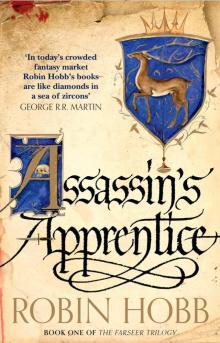 Assassins Apprentice
Assassins Apprentice The Dragon Keeper
The Dragon Keeper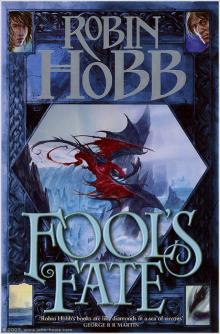 Fools Fate
Fools Fate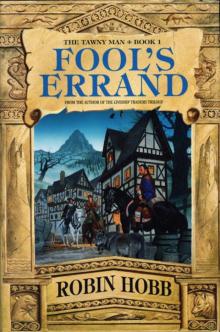 Fools Errand
Fools Errand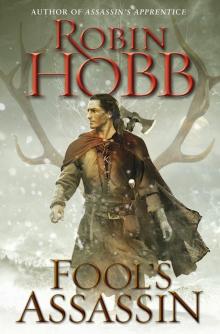 Fools Assassin
Fools Assassin The Mad Ship
The Mad Ship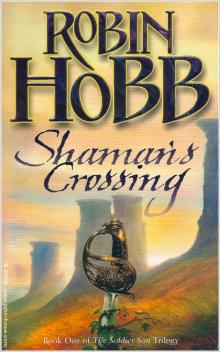 Shamans Crossing
Shamans Crossing Ship of Magic
Ship of Magic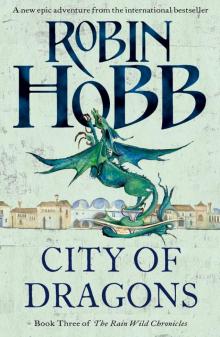 City of Dragons
City of Dragons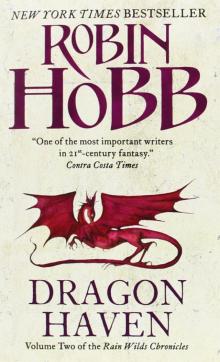 Dragon Haven
Dragon Haven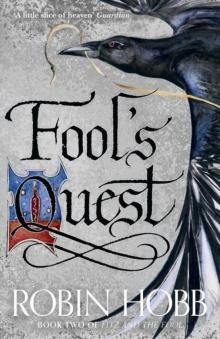 Fools Quest
Fools Quest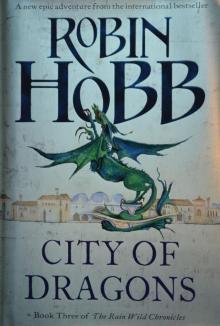 Blood of Dragons
Blood of Dragons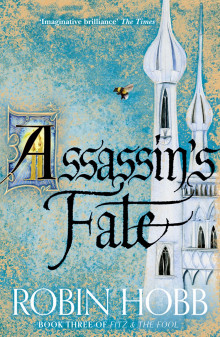 Assassin's Fate
Assassin's Fate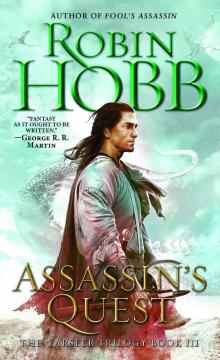 Assassins Quest
Assassins Quest Renegades Magic
Renegades Magic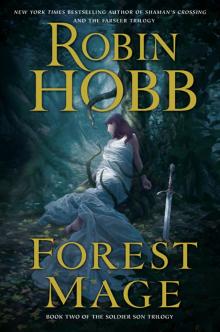 Forest Mage
Forest Mage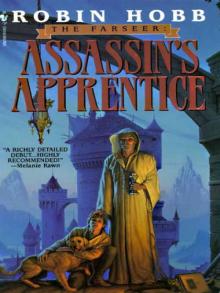 Assassin's Apprentice tft-1
Assassin's Apprentice tft-1 Assassin's Quest tft-3
Assassin's Quest tft-3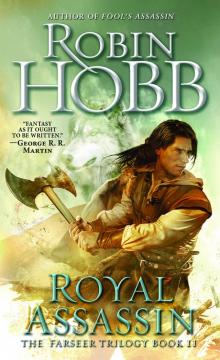 Royal Assassin
Royal Assassin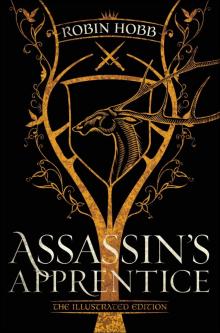 Assassin's Apprentice (The Illustrated Edition)
Assassin's Apprentice (The Illustrated Edition) Assassin's Quest (UK)
Assassin's Quest (UK) Royal Assassin (UK)
Royal Assassin (UK)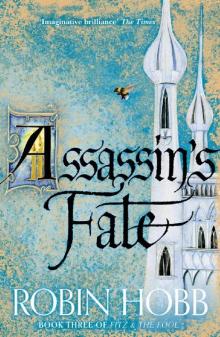 FF3 Assassin’s Fate
FF3 Assassin’s Fate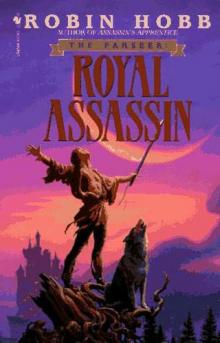 Royal Assassin tft-2
Royal Assassin tft-2 Fool’s Assassin: Book One of the Fitz and the Fool Trilogy
Fool’s Assassin: Book One of the Fitz and the Fool Trilogy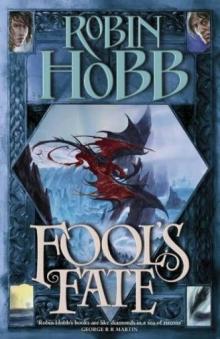 Fool's Fate ttm-3
Fool's Fate ttm-3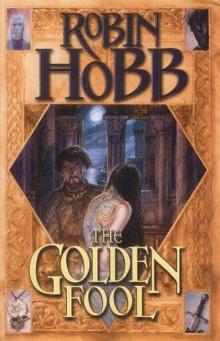 The Golden Fool ttm-2
The Golden Fool ttm-2 The Liveship Traders Series
The Liveship Traders Series The Wilful Princess and the Piebald Prince
The Wilful Princess and the Piebald Prince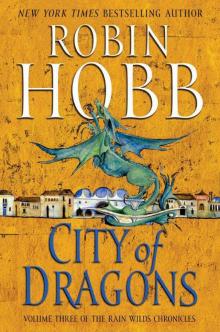 City of Dragons rwc-3
City of Dragons rwc-3 The Tawny Man 1 - Fool's Errand
The Tawny Man 1 - Fool's Errand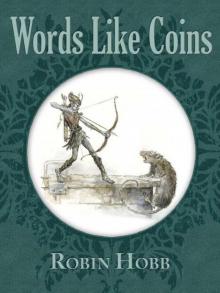 Words Like Coins
Words Like Coins The Complete Tawny Man Trilogy Omnibus
The Complete Tawny Man Trilogy Omnibus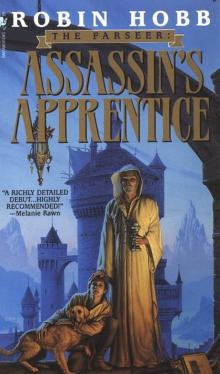 Farseer 1 - Assassin's Apprentice
Farseer 1 - Assassin's Apprentice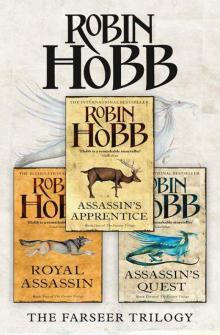 The Complete Farseer Trilogy Omnibus
The Complete Farseer Trilogy Omnibus The Soldier Son Trilogy Bundle
The Soldier Son Trilogy Bundle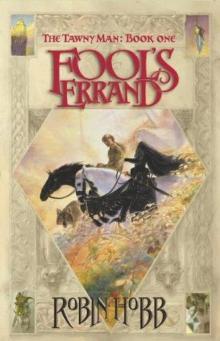 Fool's Errand ttm-1
Fool's Errand ttm-1 Blue Boots
Blue Boots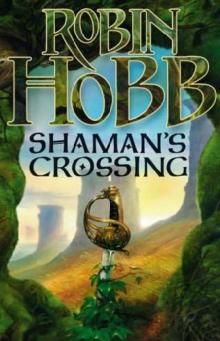 Shaman's Crossing ss-1
Shaman's Crossing ss-1 Mad Ship
Mad Ship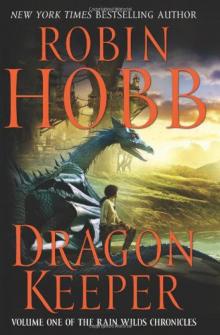 Dragon Keeper
Dragon Keeper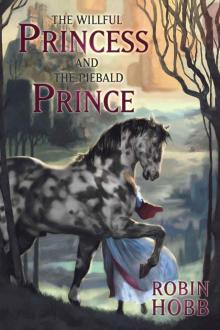 The Willful Princess and the Piebald Prince
The Willful Princess and the Piebald Prince Ship of Destiny tlt-3
Ship of Destiny tlt-3 Rain Wild Chronicles 02 - Dragon Haven
Rain Wild Chronicles 02 - Dragon Haven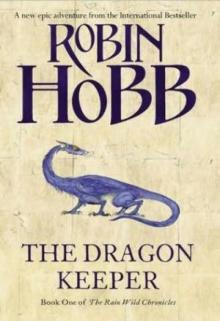 The Dragon Keeper trwc-1
The Dragon Keeper trwc-1 The Triumph
The Triumph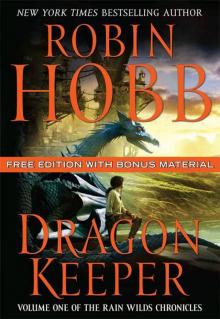 Dragon Keeper Free Edition with Bonus Material
Dragon Keeper Free Edition with Bonus Material Mad Ship tlt-2
Mad Ship tlt-2 The Inheritance and Other Stories
The Inheritance and Other Stories Tawny Man 02 - Golden Fool
Tawny Man 02 - Golden Fool Farseer 2 - Royal Assassin
Farseer 2 - Royal Assassin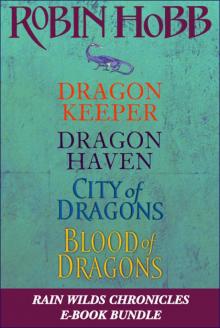 Rain Wilds Chronicles
Rain Wilds Chronicles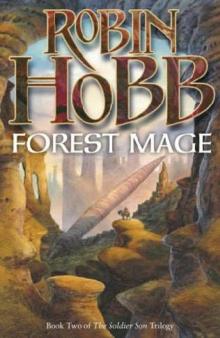 Forest Mage ss-2
Forest Mage ss-2 Ship of Magic lt-1
Ship of Magic lt-1 Renegade's Magic ss-3
Renegade's Magic ss-3